
Inter Arma Talks "Sulphur English" Following Explosive Release-Day Set in Philly

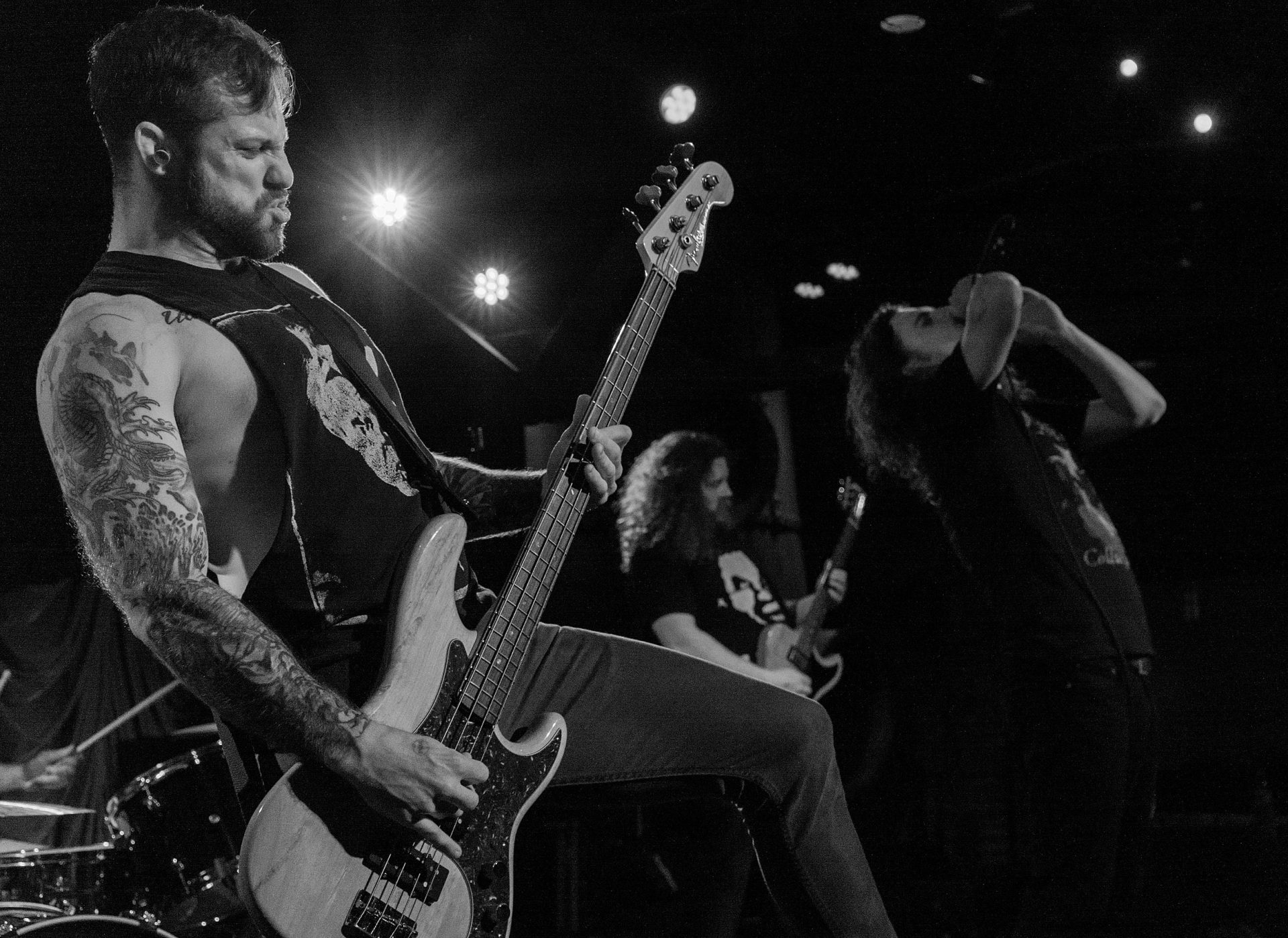



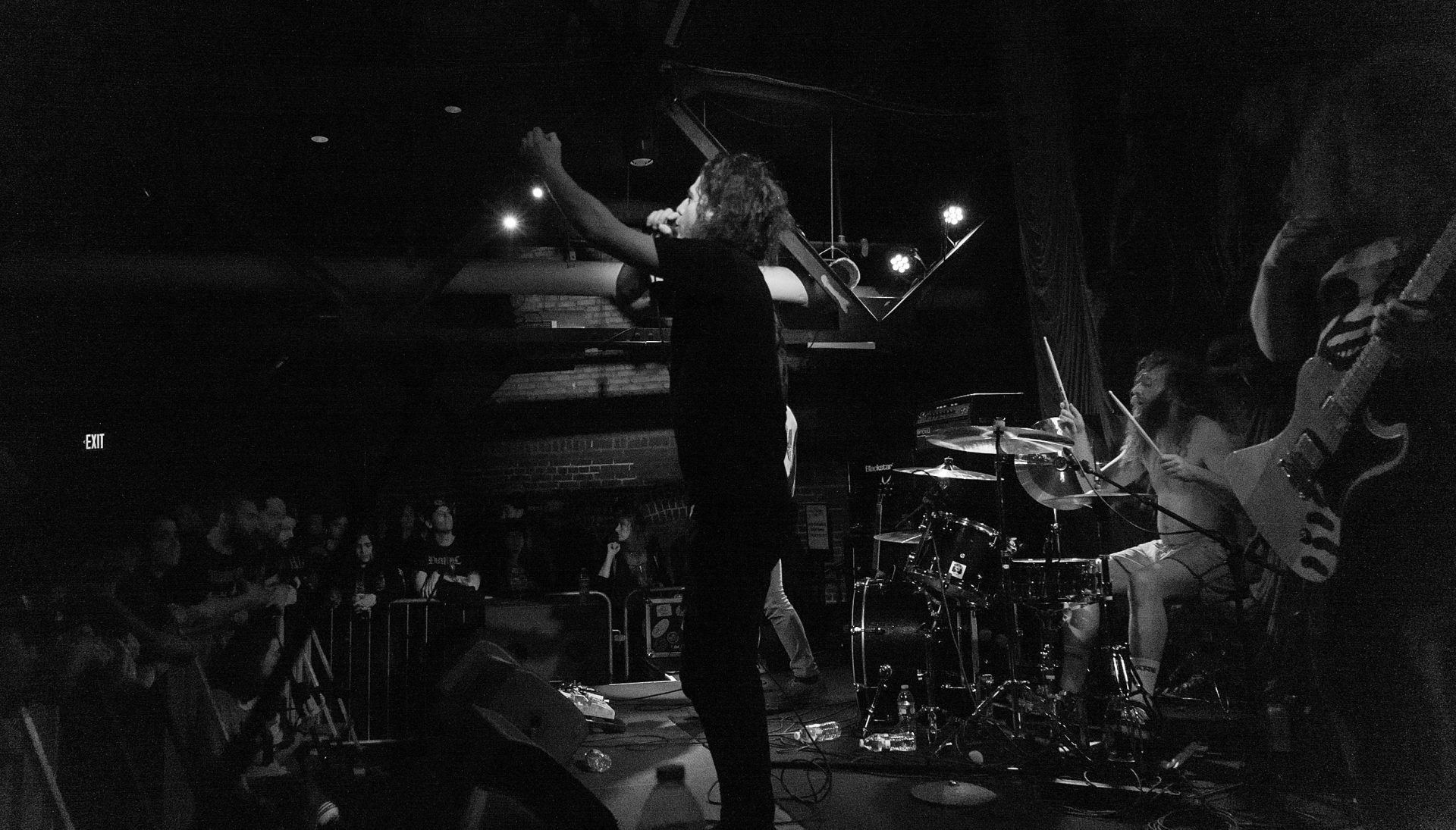
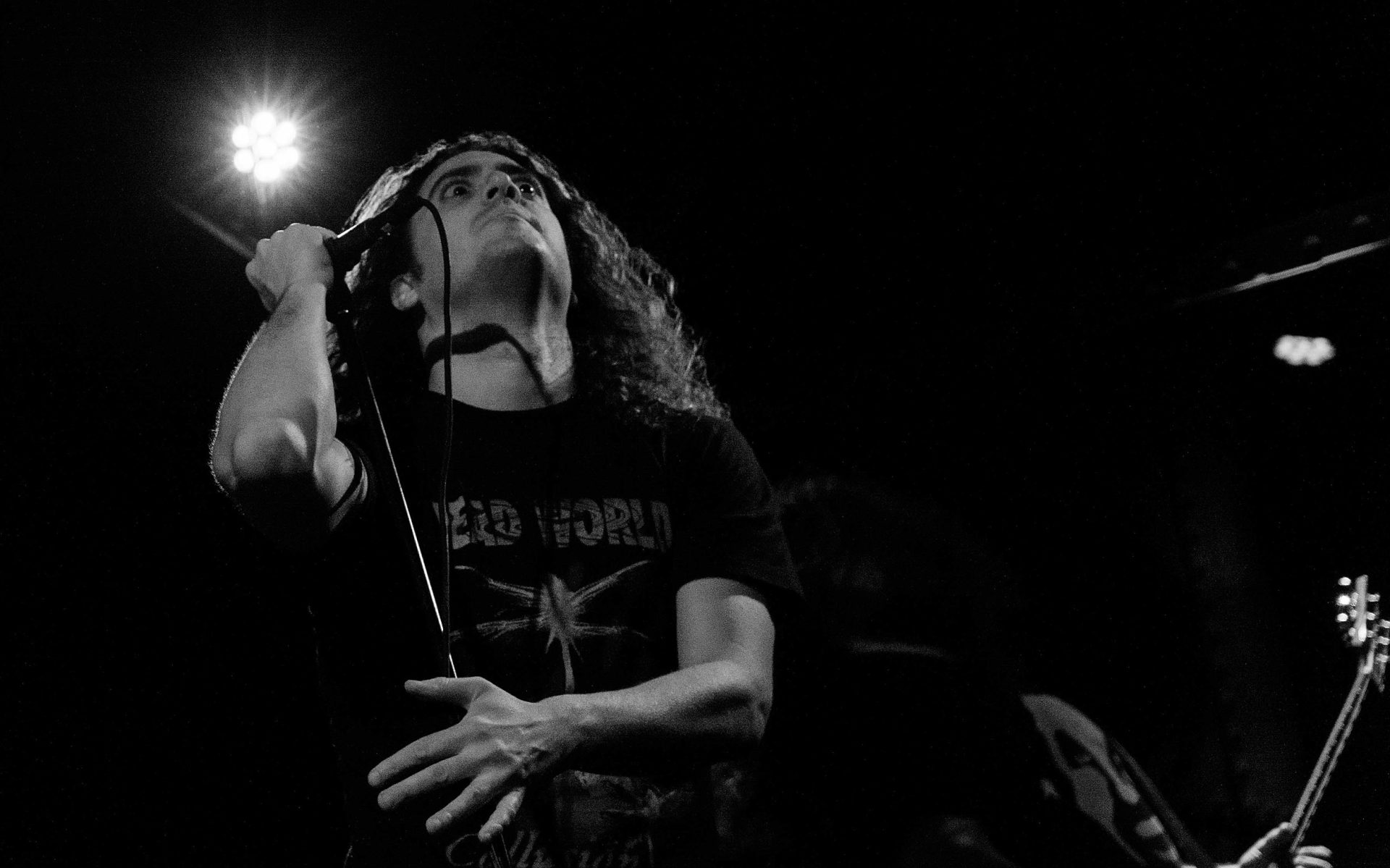


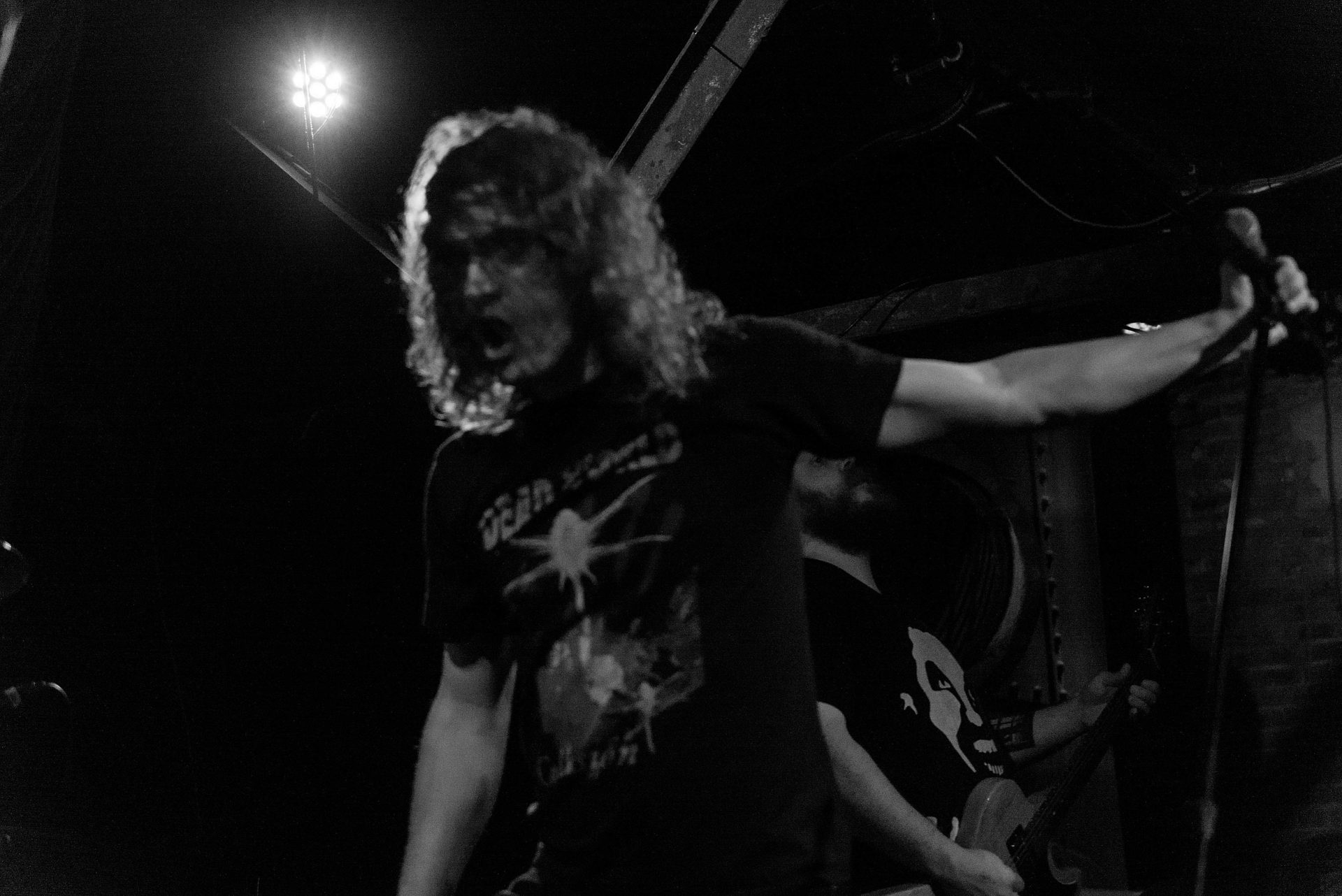
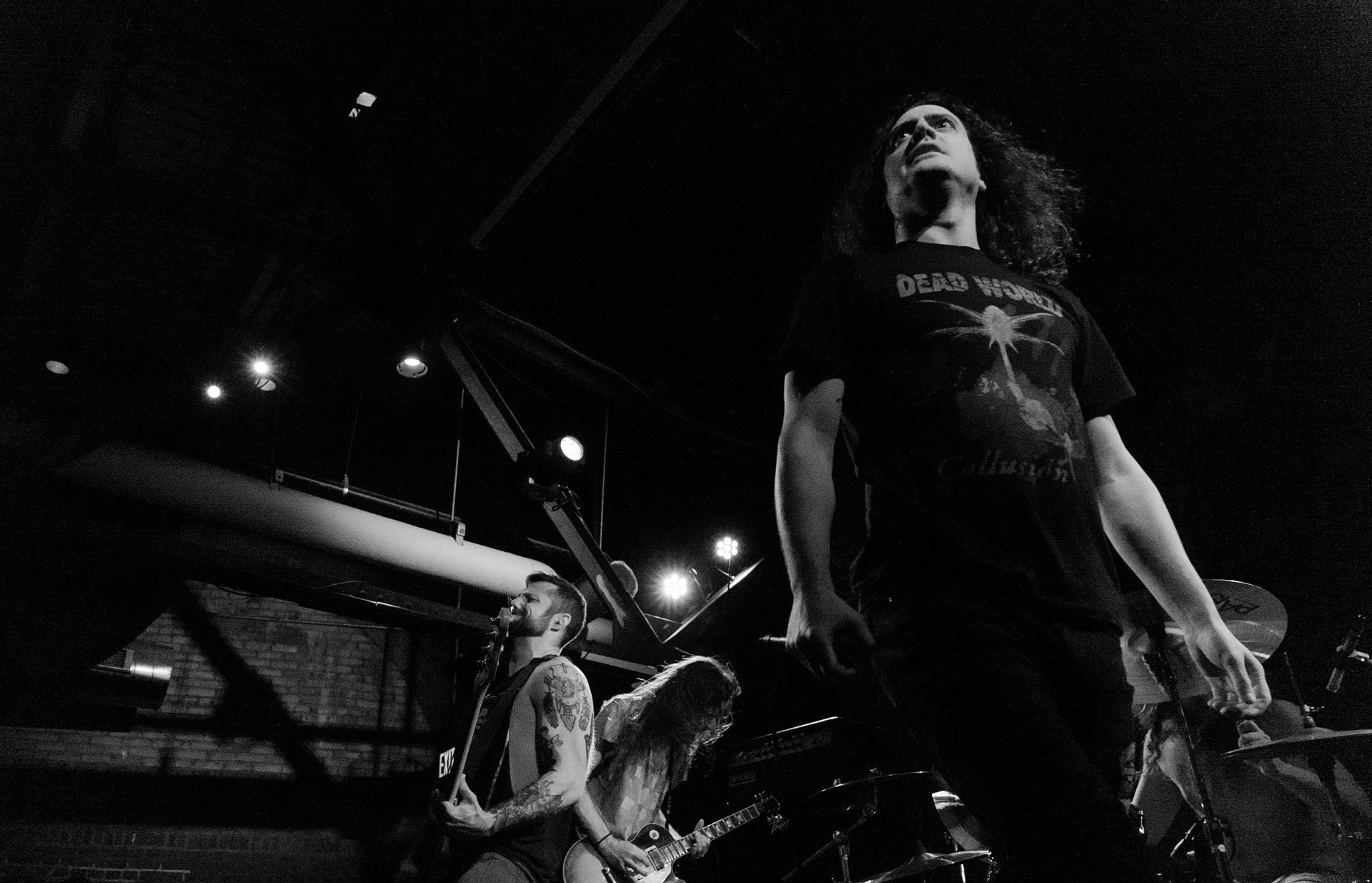
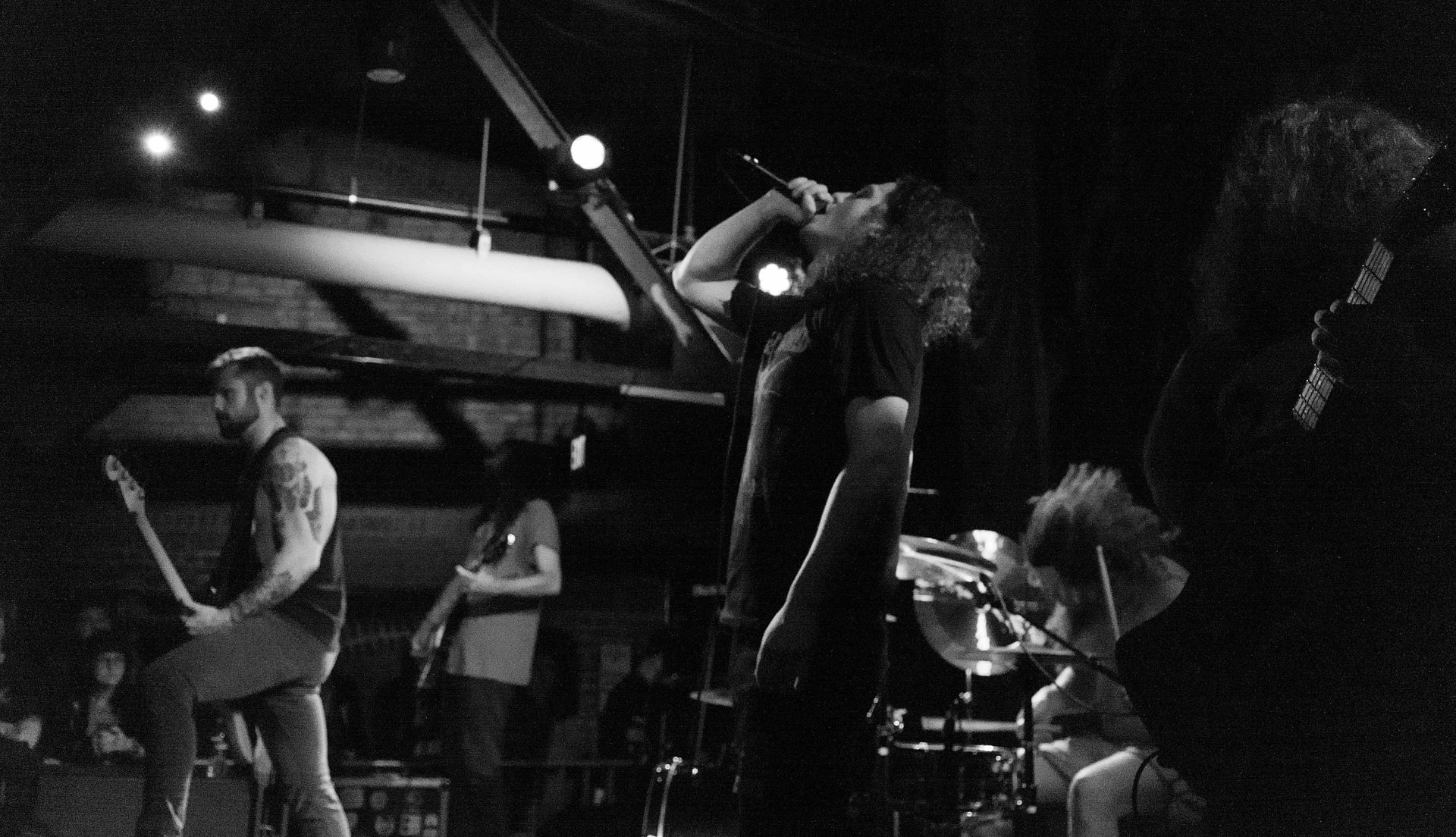
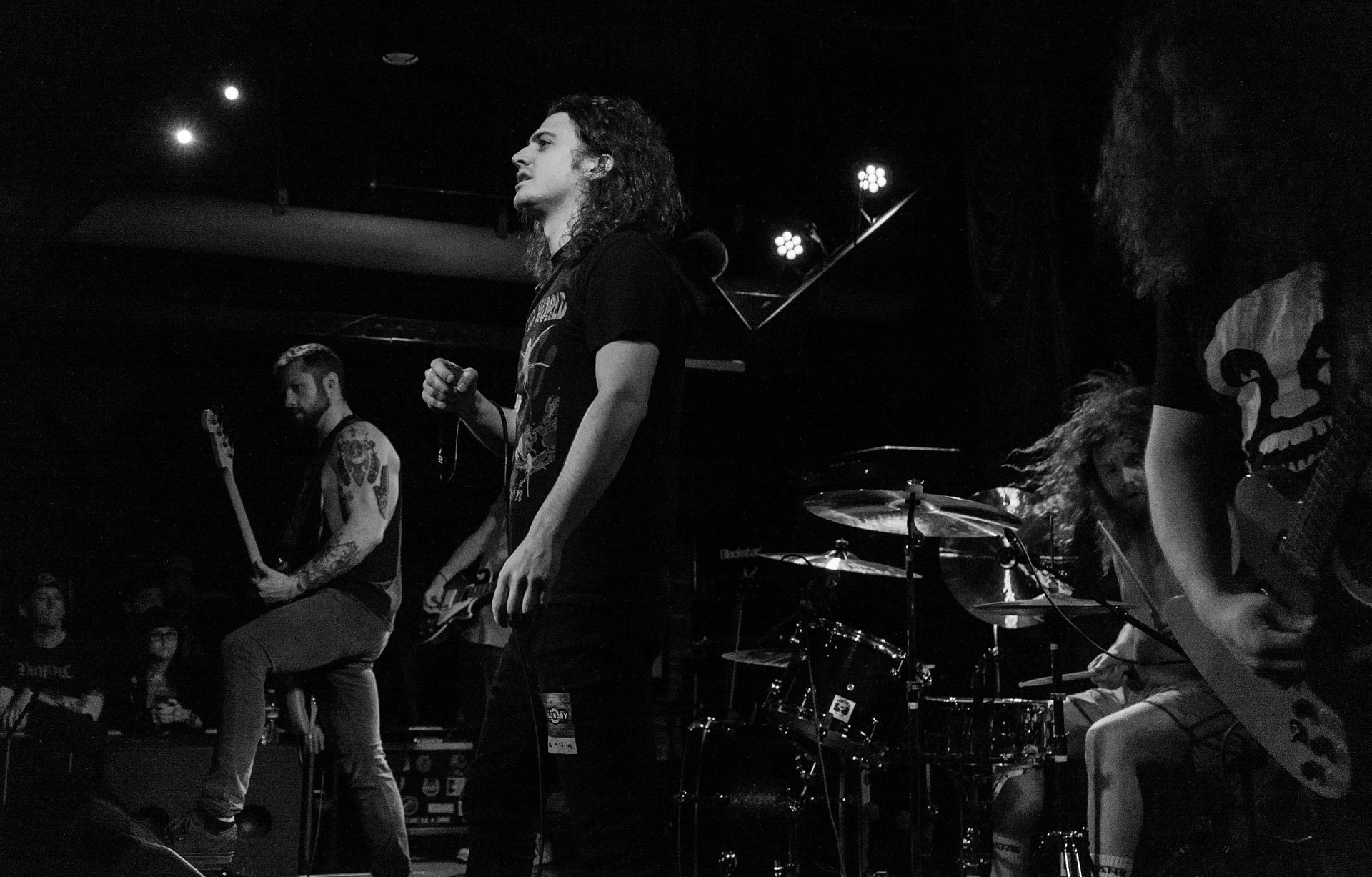
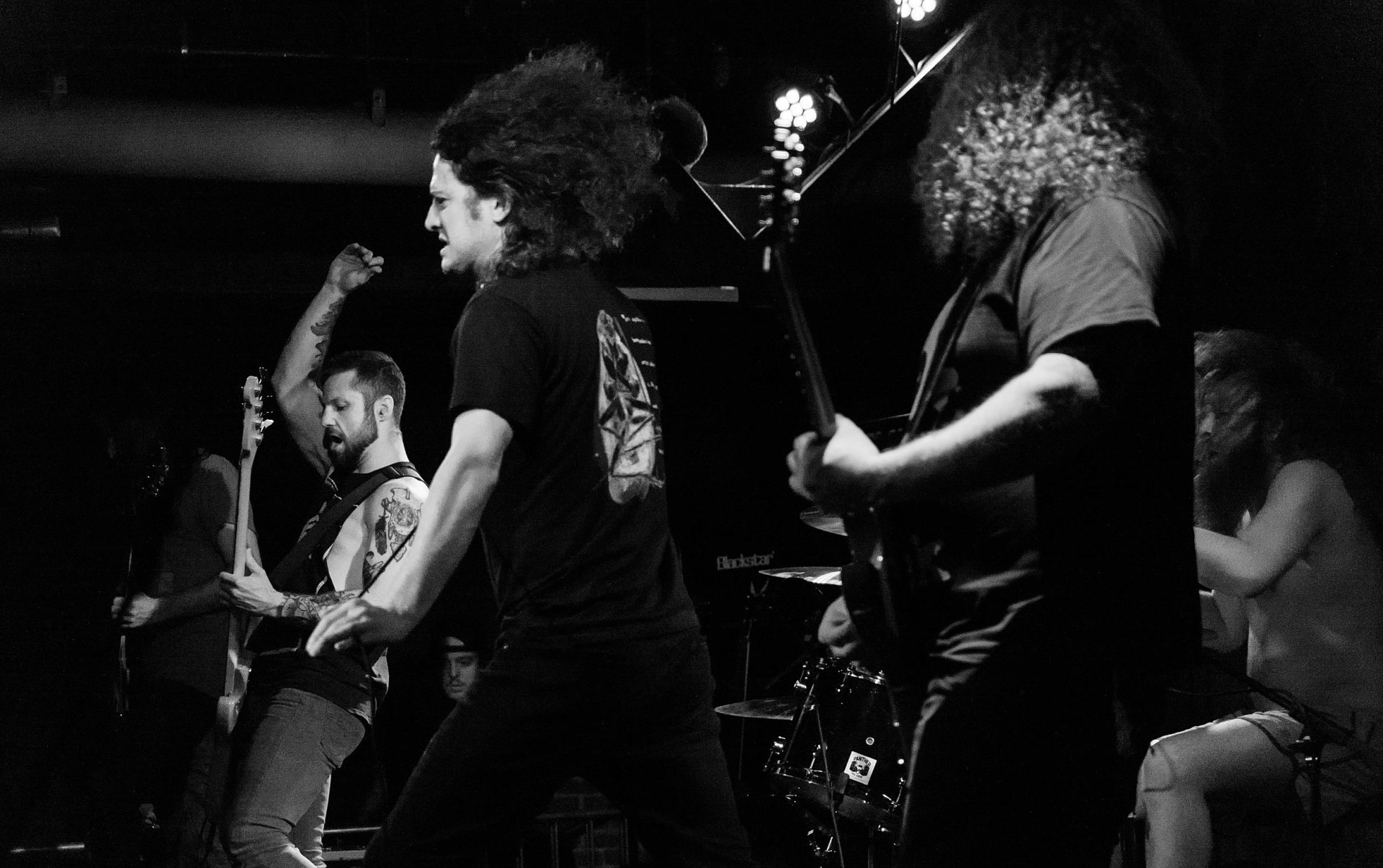
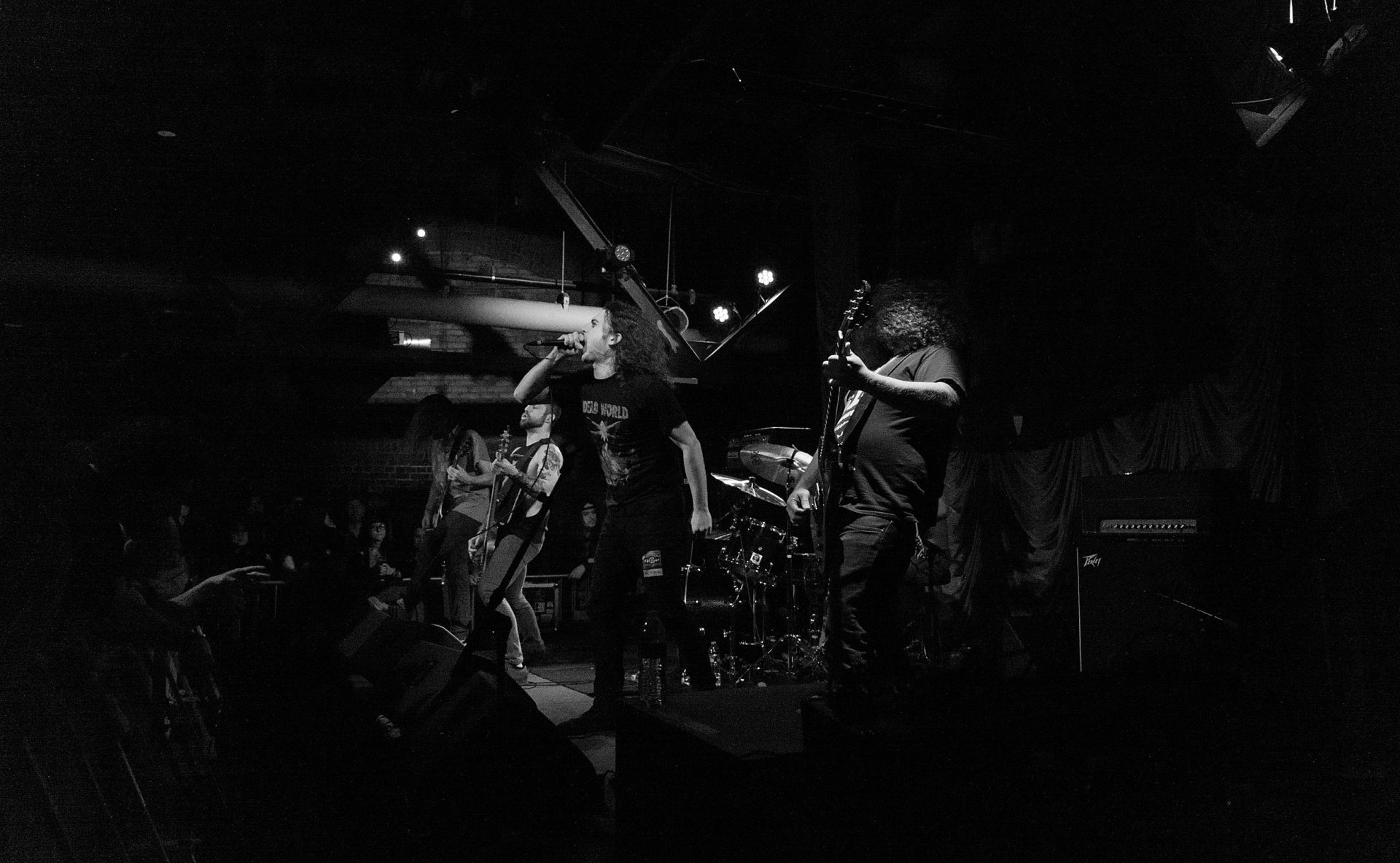



…
We’re talking about Sulphur English, the brand-new Inter Arma release. Specifically, we’re talking about how it is not a doom record. The conversation is taking place in a van overloaded with clothes and empty soda bottles and whatever else is on the floor.
At that exact moment, a downpour starts, unleashing thousands of raindrops that very loudly pelt the top of the metal vehicle. “Now that I say it doesn’t sound like a doom record, the rain comes down and it sounds like the beginning of ‘Black Sabbath,’” drummer TJ Childers sighed. “Story of my fucking life.”
Just being in the van at all was a small triumph. The band was delayed several hours getting into Philadelphia and only arrived with just enough time to toss several cardboard boxes of t-shirts behind what was a conspicuously empty merch table before heading to the stage.
No soundcheck? No problem. Load in, strap in, play 35 brutally intense minutes unveiling new material from the band’s fourth album that happened to come out that very day… all while almost everyone from their label (plus Decibel Magazine) are in attendance, since the show is part of the Decibel Metal & Beer pre-fest. No pressure.
Most bands dislike doing interviews after a set, and nobody can blame them: they’re sweaty and tired and have to think about other things like drinking and eating and talking to fans buying their wares. Having come in so late, Inter Arma was prepared to talk to Invisible Oranges, but finding a place in the venue where they didn’t have to speak over Full of Hell proved difficult.
Oddly enough, it was Sean Lennon and Les Claypool’s fault.
The same day of the pre-fest, The Claypool Lennon Delirium was performing downstairs on the main Fillmore stage. This meant they also had the dressing rooms that bands playing upstairs could normally use. The only one upstairs belonged to Integrity, who were headlining, and they were using it. So, it was off to the van well past 10:00 p.m., when aside from the aforementioned rain there was sufficient silence to converse with Childers along with guitarist Trey Dalton about the potent Richmond scene, how they got John Darnielle of The Mountain Goats to write their bio (and how they could kick his ass if they had to, but they never would), and how Sulphur English isn’t a doom record, despite what the rain gods might think.
…
…
The first song you released was “Citadel.” A citadel is a fortress, typically on high ground protecting or dominating a city. What is Inter Arma’s citadel?
Trey: Well, if you want the more specific answer to that question, you would have to refer to Mike [Paparo], our vocalist, singer. It’s more of a metaphorical thing for him. It’s for all intense as porpoises [sic] his core being, his core beliefs, his core values, and how he doesn’t want those things to be corrupted by any sort of outside influence.
TJ: Or inside influence really.
Trey: Or inside influence for that matter. I’m not trying to interpret his lyrics, it’s his own inner conflicts so to speak, but also it deals with all of our own personal struggles and inner conflicts as a band and shit we’ve had to deal with over the years and whatnot. But also, like any good lyrics, they’re up for interpretation as well.
TJ: If you want something, I guess, what is our citadel, our fortress? If you wanted a more literal interpretation, it would probably be either this van or our practice space. I think that’s probably where we all feel the most comfortable sort of expressing this side of our life.
Trey: If we’re talking about it from that standpoint, I’d say it’s the stage. Can’t nobody fuck with me while I’m on stage!
This is going to be a weird distinction, but overall I think that Sulphur English is the least doomy record you’ve done, but the gloomiest record you’ve done.
TJ: Well, number one, thank you for not saying it’s fucking doomy! So many of these other fucking, half-cocked motherfuckers out here say it’s a doom record. There’s nothing doom about it. It doesn’t sound like something Cathedral.
Trey: The record is faster, the songs are way more up tempo, there’s lots of double bass, there’s lots of blast beats. Just because the guitars aren’t going [makes tweedly guitar noises], doesn’t mean it’s not fucking death metal…
TJ: …or anything that’s not doom or sludge or whatever people like to classify it.
Trey: It’s such a fucking cop out when anyone goes, “Oh, you guys are a doom band.” No, we’re fucking not. We’re a million miles away from doom.
TJ: We have some slow parts and I think it’s easy for people to just associate speed or tempo with a particular genre of music, especially in the heavy metal world.
Trey: Everyone calls “Citadel” a doom song. The whole fucking song has blast beats and fucking double bass! Or just about the whole song. Do some homework, man. But also it is definitely darker and bleaker on a whole.
I think that’s where I was going for the gloomy description.
Trey: It’s a dark, angry record.
TJ: It’s bleak.
What do you think caused you guys to head in that direction? Was it an intentional move to maybe shut up some of these people who keep calling you doom?
TJ: It wasn’t so much a move to shut anyone up who calls us doom or whatever. Ultimately, we don’t give a fuck about that. But it was definitely a move to say “fuck you” to the heavy metal scene in general because there’s a lot of shit going on out there that is fucking garbage. I mean, there’s a lot of shit out there that’s getting passed off as quote-unquote “metal” that is not metal. I don’t understand how people turn a blind eye to it and even quote-unquote “metal dudes” fucking wear their t-shirts and put their patches on. And I’m not even a true metal warrior because ultimately I don’t give a fuck about metal. If it ain’t ZZ Top, I don’t want to listen to it.
And this has led people to continue to miscategorize the band based on “Citadel.”
TJ: Fucking some of the shit, it just doesn’t make sense. There are no power chords on this record, except for maybe two or three. There’s no traditional Black Sabbath-type riffs where it’s a pentatonic minor scale, without getting too dorky into it. It’s all dissident, wacky, crazy shit.
Trey: It definitely, as the song started unfolding, was becoming very, very abrasive. I was down because we had touched on some of those things in the past, and it’s always been a little bit a part of what we do. But it was nice to just go full bore into something that was different. Not to toot our own horn all that much, but not a lot of dudes are doing it. It’s not a super common trend in the current heavy metal scene.
Bearing that in mind, who do you consider your kindred spirits out there?
TJ: There weren’t any bands in particular that we listened to [where] we were like, “oh, we’ve got to sound like that.” But there definitely are bands out there that we hear that are doing their own thing and we’re like, “that band is fucking rad.” Yautja… I feel like they are in their own little realm. Oranssi Pazuzu is like that. Even the newer Gorguts.
Trey: Yeah. Talk about a band that’s been doing their own thing for absolutely for so long and it’s been awesome the entire time. Despite how many times people have tried, nobody can replicate what they are able to create and I think that absolutely rules.
TJ: Ulcerate, even though we did tour with them. Jamie [Saint Merat] made me want to be a better drummer, that’s probably about as far as the fucking influence goes with that one.
When the album was coming together, did you guys notice that there was sort of a characterization of the record that was going to set it apart from the previous discography of Inter Arma?
TJ: I think we definitely knew it was going to be darker, once two or three songs were written. The first [song] was “Howling Lands.” Then we worked on the first couple parts of “Sulphur English” for a pretty long time.
Trey: I feel like we had a good chunk of “[The] Atavist[‘s Meridian].” We at least had the progression. I feel like we’ve been working on “Citadel” for forever too. We had that first bit and then it took forever to get through — which is wild, because that song is so simple for us!
TJ: Sometimes finding that bridge is a motherfucker and that one was a little bit of a motherfucker. Even though the main riff is just so doom!
[Both laugh.]
…
…
I sense slight contradictions! One thing about the record, the extremes are more extreme. When you guys drone, you’re dronier than you’ve ever done. When you’re slow, you’re slower; the ethereal parts are more ethereal, and when you prog things up a little bit, it gets even more progressive.
Trey: I think that’s a fair assessment. I don’t feel we were actively trying to do that, it felt this is what we’re writing and this is what’s coming out and this is what feels right, and they just happen to be on, like you said, pushing those ideas that had sort of existed in at least some capacity further and further into what ended up being put on the record. I feel like there are three ways that bands evolve or don’t. They stay exactly the same or put out the same exact kind of music for their entire lifetime. And there’s nothing wrong with that.
I think there are bands that … their music becomes simpler over time, which also has merit in a lot of ways. They find that maybe the complexity of the songs in their early stuff isn’t as needed and so they refine what their sound is into something that’s a little more simpler. Then I think there are bands that go the opposite direction and continue to explore more and more things, which is sometimes awesome and sometimes ends up being pretentious horseshit. I think we’re closer to the third iteration of [the] band.
TJ: Sometimes I feel like we are getting simpler with some songs. Like “Howling Lands” is one of the simplest songs we’ve ever written.
It’s cool that you actually mentioned “Howling Lands” as that’s one of the songs that stands out. I really loved the militaristic cadence of that song. The song sounds to me like sped-up funeral doom.
TJ: I can completely see that. There are a couple of us in the band who are funeral doom fans, namely Mike who fucking loves Evoken.
Trey: I dig Disembowelment and some stuff like that.
TJ: I would be lying if I said that I was completely familiar with that whole subgenre, but I do like it and I do appreciate it. I like that slow, lurching, dirgy kind of thing. I feel if you can put some sort of, as you say, militaristic cadence along with that it sort of kind of works out.
Trey: I think dirgy is a pretty accurate description. The juxtaposition between how the guitars sound and the way that the drums sound on that song makes it pretty interesting. More interesting than if you just tabbed it out and broke everything down into their respective parts. It’s not that interesting, but I think the sum total becomes pretty cool.
TJ: But now do you want to hear how the song was actually written?
I’d love to hear that.
TJ: We were trying to get into Canada for the first time and we got turned away because of me. I had a couple DUIs. I’m a man who enjoys a few sarsaparillas from time to time. In my younger days I made some bad decisions as far as the drinking and driving is concerned. In Canada, if you have any DUIs, that is fucking frowned upon. You might as well have raped a cow or a hockey puck.
We tried to get in there for the first time we got turned away because of me. I was just sitting in that passenger seat [motions to front seat of van] and I was like, “fuck Canada, fuck Canada, fuck Canada.” And that turned into [starts clapping rhythmically] “fuck Canada, fuck Canada, fuck Canada.”
Trey: It became a chant.
TJ: Then we went to Olive Garden and I was [like], “Guys, we’re going to write a song. It’ll go like this.” That’s what we do when bad things happen to us — go to an Olive Garden in upstate New York and drown your sorrows in endless breadsticks.
Another song that stood out was “Stillness.” It reminds me of the super-early Monster Magnet total psych-rock material, which is another thing that Inter Arma touched on previously but really expanded on it here.
TJ: We definitely enjoy that whole psychedelic, psych-rock thing. The only Monster Magnet song I’ve ever heard is “Space Lord.” I don’t think any of us are into that band, but we all definitely like some old psych stuff. To me, that song and a lot of the stuff that we do that’s more melodic and more acoustic these days, to me it sounds more like Crosby, Stills, Nash and Young. That’s my shit. I love that couple records that they put out.
Trey: I’m a sucker for three part harmony.
TJ: Yeah, anytime there’s harmony vocals and… like a subtle intensity kind of thing. It’s not loud and it’s not crazy, but there’s still an intensity there. I’m always a big fan of that sort of thing, whether it’s TS&Y or Neil Young, Pink Floyd. Any time there’s a laid back but still intense type of thing.
Metal Archives says that your lyrical themes are “journeys, apocalypse, death,” whereas we can contrast that with what Mike said in the bio that most of the lyrical content on the new album is very deeply person to him. Unless he’s personally going on journeys of apocalyptic death, it seems like there’s been a departure here.
TJ: I think there was a little bit this time. I think that without putting too many words in his mouth, he wanted to try some different things lyrically. Because in the past, he’s very much conceptual as far as how he approaches his part of the songwriting. He’ll come up with an idea, whether it’s more philosophical or he read a poem that was interesting to him and he would come up with something based around those ideas. A lot of it was at least mostly unrelated to personal issues. He would probably tie in some things here and there, but this time I think he wanted to get some things out that he had probably shied away from in the past. I don’t know what specifically caused him to make that call.
Trey: Mike’s such a good lyricist. Even when he talks about personal things, he does it on a very grandiose scale without sounding like a total asshole He’s able to relate what he’s trying to say in a way that it almost paints a picture. [But] again, I always think that the best lyrics are up for interpretation. They can mean whatever the reader or listener, however they interpret them, and they can get something out of it. To me, even when he is being deeply personal, it’s not like, “I’m so sad and I just hate my life.”
Inter Arma: The Emo Years.
TJ: We’re emo as hell, but you just don’t know it! It’s still sounds like it could be taken out of a few paragraphs from a fucking Cormac McCarthy novel.
Trey: He’s a huge fan of classic poetry, and I think that it comes out in his word choices and how he turns phrases. I’m always super impressed with his lyrics, and I think a part of that is because every time I’ve ever tried to write lyrics for anything, they’ve always turned out just total garbage. I respect people who can come up with things that sound right and are interesting and paint a picture that can be interpreted in tons of different ways. I dig it, I’m real happy with what he did on the record. I actually think the lyrics to “The Atavist’s Meridian” are some of his best. I think they’re really, really good. If you want to, you could probably interpret them as more of like, as Metal Archives would say, a journey. But you could also interpret them as being very personal or more abstract based in philosophy or something like that. You could go a lot of different ways. I think that’s signs of a good writer.
TJ: I’m more partial to “Sulphur English.” He has a very distinct and unique way of telling you how he feels about issues without coming right out and saying what said issues are and making it sound like there’s demons up on the fucking mountaintop who want to kill you, even though that’s a terrible metaphor. I really dig that one. That was actually why I think I was the first one to say, hey, I think the album should be called Sulphur English.
You had John Darnielle from The Mountain Goats do your bio. How did that come about?
Trey: We found out that he was a fan a few years back. He would come out to any show we played in the Durham or Raleigh, North Carolina area, which is where he’s based usually. As long as he was in town, he was there. He would talk our ear off about stuff. We knew because he did the little things in Decibel every now and then, we knew he was at least mostly like a metal dude. But he was rad, he’s always been nice and fun to hang out with at those shows.
I don’t know who approached him to do it, if it was Mike or if it was Relapse Dudes or if he offered, I actually don’t know. I think it was Relapse Dudes. Was it at the Richmond Mountain Goats show that he shouted out at us? I can’t remember if it was you or someone who shouted out that Inter Arma sucks.
TJ: Oh, yeah, he said in the middle of the set, ”Everyone in this audience who hasn’t seen or heard of Inter Arma should go check that band out and go see them whenever they get the chance because they’re great.” I said – I was like half drunk, which I am right now – “That band fucking sucks.” He goes, “I don’t know who said that, but I’ll kick their ass.” Something to that effect.
Did he indeed kick your ass?
TJ: He didn’t. I would fuck him up. I would never! But I would fuck him up if we had to get right down to the street.
…
…
This was Joe Kerkes’ last record as your bassist. Did you know he was leaving when you were recording it?
Trey: We didn’t know when we were recording that that was going to happen. He brought that up after the fact. I think the idea was that he and his lady wanted to move up to Maine. They had started batting around the idea, but hadn’t necessarily made any specific this is the deal thing yet. So he brought it up, I don’t know, a month or so later, and we sort of talked about it, and then he’s moving to Maine and that’s super far away. So logistically it wasn’t going to work out. For the purpose of the record, it didn’t really change anything.
I assume you guys knew Andrew Lacour because of the touring with KEN mode?
Trey: Yeah. We toured with them a few times. He had moved to Richmond and he’s been a good friend of ours ever since those tours. When everything went down, it seemed like a pretty natural fit and now here we are.
Speaking of Richmond, what’s in the water there that makes for such a great metal scene?
TJ: Richmond, like any other fairly large and/or cool city, is very transient. There are a lot of people coming and going. It’s easy to live there. A lot of people who lived probably in Philly or New York caught wind of the fact that it costs… if you’re living in Brooklyn it costs a quarter of the price to live there. That’s a very big part of it. But also in the case of us and in the case of a number of bands that are from there, it’s a nice middle ground. I’m from an hour and 15 minutes northeast.
Trey: Me and Mike are from about three hours southwest.
TJ: Pretty much anyone who lives in Virginia, that’s the only really cool place to go fucking live.
Trey: Yeah, if you’re going to stay in Virginia and you want to do anything music or art related, you’re probably going to Richmond.
TJ: Even if you live in Raleigh. There’s a shit ton of Raleigh implants up there. We get a lot of DC people.
Trey: I mean recently we’ve got a whole bunch of northeast folks coming down. We get tons of Massachusetts and New Jersey people.
TJ: People get burned out on fucking Austin and they get out of Austin and they move to Richmond.
Trey: Compared to a lot of other cities on the east coast, it is a lot cheaper. There is, I guess, an allure of this place that’s churning out cool stuff and people like to be a part of burgeoning scenes. You get just lots of people coming in.
Sulphur English came out today! How excited are you?
Trey: It’s exciting for me. We’re going to be able to go on tour a bunch more over the course of 18 months, two years, whatever. But also, more so for me, I just feel like it’s a purging: this shit is out into the fucking ether. All these riffs, all this music, all these ideas, all this shit we’ve been sitting on for the past year and a half, or however fucking long it is, it’s out.
It feels like you’ve taken a great big shit and now you’re ready to go back to Hardee’s and get another six dollar box!
…
Support Invisible Oranges on Patreon; check out Invisible Oranges merchandise on Awesome Distro.
…










